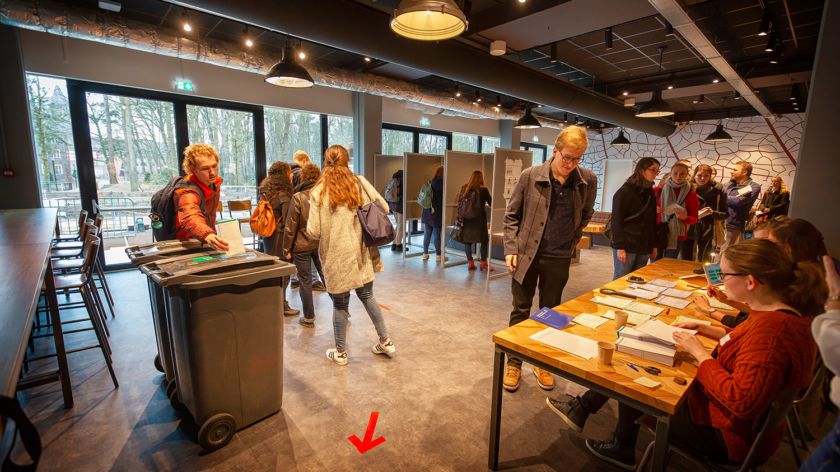International students on municipal election: ‘If you don’t speak Dutch, you can feel a bit lost’
-
 Provinciale verkiezingen in 2019. Foto: Dick van Aalst.
Provinciale verkiezingen in 2019. Foto: Dick van Aalst.
Next week, Nijmegen’s municipal elections will take place. In them, international residents - and students - of the city can cast their ballots as well. But especially for those with limited Dutch language skills, orienting yourself in the political landscape of the Netherlands can be challenging. ‘I think the language barrier can lead to misinformation.’
Martyna, 21, Biology, from Poland
‘There is definitely a barrier when it comes to getting to know the political system in the Netherlands. A lot of information is in Dutch, so if you don’t speak Dutch or you’ve only started to learn it, you can feel a bit lost. It would be great if more information from parties or even the university on the municipal election would be available in English. We already have a Radboud international page on Instagram, a guide or shared links from them could be really helpful in making this election more accessible.’
‘I’m happy that I can contribute’
‘Until quite recently, I didn’t know that I could vote in this election. But my Dutch friends started talking about it and I also received a voting pass. I already did some research, but I’m going to go to the Verkiezingsmarkt at the city library on Saturday to get more information. There will be members of the parties and I plan to ask some questions, so I can decide who is going to get my vote. For me, it’s important to vote, also as an international student, because we are going to live in Nijmegen for at least a few years and the outcome of this election is going to have an effect on us. I’m happy that I can contribute to it.’
Jill, 21, Comparative European History, from Germany
‘What I really like about voting in the Netherlands is that there is no electoral threshold. In Germany, if a party receives less than five percent of the total vote, it doesn’t gain any spots. If you’re giving your vote to a small party in Germany, it’s a lost vote – but in the Netherlands, I can vote for a small party and it still counts. Because of that, I plan to vote for the Partij voor de Dieren. Animal rights are very important to me and I feel like this party represents me best.’

‘For the past weeks, I’ve noticed a lot of advertisements, both around the city and online. But I tried to look more at the programmes of some of the parties. You obviously still have to take these with a grain of salt, but I think it gives you a more rounded idea of what the parties are about. Reading the programmes, I understood probably 90 percent of them with my limited Dutch and Google translate, but especially for internationals who don’t speak Dutch, getting information can be really difficult. That’s a shame, because I think this language barrier can lead to misinformation.’
‘In the Netherlands, I can vote for a small party and it still counts’
Alkinoos, 20, Biology, from Cyprus
‘I’ve actually never voted before, so this will be my first election. But at the moment, I feel like I’m not informed enough yet. Finding information in English is quite hard, so I’m talking with my Dutch friends about it and I did a test where you can indicate topics that are important to you to see which party aligns most with your interests – that was in English. The only party that I know of that provides information in English is GroenLinks. That is definitely a plus point for me, because it shows that they care, but I haven’t made a decision who I will vote for yet.’
‘I wish internationals could also vote in the Dutch national elections’

‘I already knew that you could vote in municipal elections within the European Union, even if you’re only a resident and not a citizen, so I wasn’t surprised that I could vote in this election. However, I wish internationals could also vote in the Dutch national elections. In the end, we live in the same country and under the same legislation as Dutch citizens and it would be nice to also be able to vote for parties on a national level deciding on important issues. In the end, these concern us as much as Dutch natives.’
Nijmegen votes
Next week, Nijmegen is going to vote on the new members of its city council. On the 14th, 15th and 16th of March, residents can cast their ballot. EU citizens that are registered in Nijmegen and non-EU citizens that have been registered and living in Nijmegen for at least five years can also vote. Votes can be cast at 30 spots all over the city, including the Berchmanianum, Radboudumc and the HAN.





Agnieska schreef op 11 maart 2022 om 14:27
There is literally no need at all for providing information in English. If you refuse to learn the language of the city you are living in, there is no need for you to have an opinion about the multitude of tasks the municipality has to deal with. Of course you can vote, but just look up the information yourself and just read and translate the programs. Do not expect parties to actively involve an extremely marginal part of the city by using a language that normal people do not use every day.
Same goes for national election. If you only are only an inhabitant and not a citizen, it is not more than common sense that you cannot vote as you don’t have any connection with the country you live in and you have no feeling for the problems that need to be solved and the tasks the government stands for.
Student 2 schreef op 12 maart 2022 om 12:49
Why assume that these people refuse to learn to learn Dutch? Many international students do try to learn Dutch. If you’ve been here for a short while, as many international students are, it’s understandable that you can’t read election programmes yet. The fact is that all citizens of the municipality have the right to vote, whether they speak Dutch or not. I don’t think it’s necessary to speak Dutch to feel a connection to where you live. They are also allowed to have an opinion on where they spend their time every day, it’s written in the law. Doesn’t matter what other people think “should” be the case.
I think it’s good that this article was published because then party members can read it and make their own decision about this topic. After all, including more people in their campaign could mean more votes for them.
Make no mistake, I think it’s logical that the communication by parties will primarily be in Dutch, but I think it’s a bit more nuanced than just “shut up, speak Dutch”.
Student schreef op 11 maart 2022 om 14:56
Misschien is het zo dat die 5 internationale studenten die a. kunnen stemmen en b. het überhaupt interesseert wat er in Nederland en de Nederlandse politiek gebeurt, ook maar eens Nederlands kunnen gaan leren? Ik word een beetje moe van de houding van internationale studenten dat alles maar voor hen gefaciliteerd moet worden. Een stukje eigen verantwoordelijkheid mag je ook wel verwachten. Als ik in bijvoorbeeld Finland zou mogen stemmen, lijkt het mij toch zeer logisch dat de politieke partijen allereerst in het Fins zouden communiceren. Als ik het dan niet begrijp, is het aan mij om de taal te leren, niet aan de politieke partijen. Ik vind het echt heel erg onredelijk als je te gast bent in een land en je vervolgens gaat beklagen over dat je alles niet begrijpt omdat het in de taal is die in het land gesproken wordt.
Student 2 schreef op 12 maart 2022 om 12:28
Waarom ga je ervan uit dat deze internationale studenten geen Nederlands willen leren? Ik ken er persoonlijk heel veel die dat wel willen doen. En als je een korte tijd in een land bent, zoals veel internationale studenten, kan er toch niet van je verwacht worden dat je meteen een verkiezingsprogramma kan lezen. Ik vind het ook logisch dat informatie van politieke partijen allereerst in het Nederlands wordt gecommuniceerd, maar aangezien niet alleen mensen met een Nederlandse nationaliteit mogen stemmen voor de gemeenteraad zou het toch in het voordeel zijn van partijen om de info ook in het Engels aan te bieden? Dan krijg je alleen maar meer stemmen omdat meer mensen het kunnen lezen. Sommige partijleden zullen wellicht dit artikel lezen en dan kunnen zij zelf overwegen of ze info ook in het Engels willen doen. Komt er toch iets uit dat “”geklaag”” van internationale studenten.
Student schreef op 14 maart 2022 om 11:09
@ Student2
Internationale studenten, verreweg de meesten althans, hebben een bijzonder hautaine houding tegenover Nederland en de Nederlandse maatschappij. Alles moet maar voor hen vertaald en gefaciliteerd worden. Zo hebben we de maatschappij niet ingericht. Neem wat eigen verantwoordelijkheid, leer de taal die in een land wordt gesproken, verdiep je eens in de cultuur. Zou jij het niet raar vinden als ik in Duitsland constant maar blijf verwachten dat verenigingen alles naar het Nederlands vertalen? Dat is écht heel erg onredelijk. En het blijft maar doorgaan de hele tijd. Kijk maar eens wat dat brengt op bijvoorbeeld de TU Eindhoven.
En nee, de oplossing is niet dat politieke partijen info in het Engels aan gaan bieden, aangezien zij in dienst staan van het Nederlandse volk, dat (het is echt waar!) gewoon Nederlands praat. Het enige dat je bereikt met het door jou geprezen vertalen naar het Engels is nóg meer afstand tussen politiek en burger creëren.